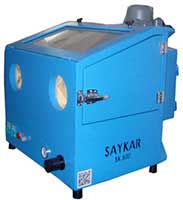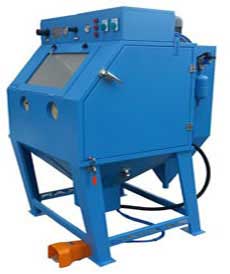




 |

 
 |
 ГЛАВНАЯ СТРАНИЦА ГЛАВНАЯ СТРАНИЦА |
 О НАС О НАС |
 СПИСОК ЛИТЕРАТУРЫ СПИСОК ЛИТЕРАТУРЫ |
 КОНТАКТ КОНТАКТ |
 ВИДЕО ВИДЕО |
|
|
 | ||
INFORMATION ABOUT MEDICAL SANDBLASTINGYou can find information about medical sandblasting and medical sandblasting machines on this web page. Medical materials that require sandblasting are usually produced by using stainless steel and titanium alloy materials. Sandblasting is done in order to provide a better fit to the human body and to form surface bonds to increase the biocompatibility. Considering many manufacturers’ reliance on manual blasting processes, a number of factors determine the quality of the blasted surface finish, including the media, the blast equipment and the technique of the operator. Certainly, the purity and the physical characteristics of the blasting media are of basic importance, since the shot or grit particles actually do the work as they impact the surface. Glass beads and white aluminum oxide with their inert structures are preferred especially for medical sandblasting. Achievement of osseointegration as well as related to the surgical method, prosthesis - implant material and design, depend on also surface properties. Studies have shown the effects of surface characteristics on bony response. Sandblasting cabinets are preferred widely in the process of medical equipment sandblasting. The performance of the cabinet-blasting equipment depends on many details of its design and fabrication, as well as proper adjustment and maintenance. To develop a comprehensive blast system specification, every element that affects media delivery, media reclamation and dust collection is carefully evaluated. Additionally, the blast machine builder is expected to incorporate all the necessary features to yield a blast process that can be validated. | ||
| SK 500 Benchtop Sandblasting Machine | SK 1000 Sandblasting Machine | |
 |
 |
|
 | ||
Abrasive blasting is a primary technology used to prepare surfaces for advanced coatings or critical bonding operations. In this type of technical surface preparation work, it is necessary to produce a specified surface texture or a measurable roughness so the blast system may have special features to ensure that the particular surface condition can be generated repeatedly. Medical Sandblasting can be applied to wide range of materials succesfully: Titanium, Stainless Steel, Copper, Silicon, Pyrolitic Carbon, Nitinol, Inconel, Aluminum, Polypropylene, Ceramic, Graphite, PTFE, Kovar, Brass, Silicone, Glass. Medical Sandblasting is for precision conclusion: Implantable Devices, Implant, Catheters, Guide Wires, Tubular Components, Needles, Vascular Stents, Surgical Instruments, Medical Molding, Medical Electronics. One of the most widespread applications in the production of medical equipment, implantable devices and surgical instruments is cosmetic finishing, in which media such as glass beads, ceramic shot or stainless steel beads are used to blend-in tool marks and superficial imperfections to produce an overall satin sheen appearance that prevents glare and reduces the reflectivity of surfaces. In some cases, such bead-blasting is a specified pretreatment for anodizing, plating or other chemical finishing processes. Nondestructive blast cleaning is a common requirement for investment cast, forged, brazed, welded, heat-treated, laser-cut or laser-drilled medical components. Blasting can also be a fast and effective method of deburring precision components using non-abrasive or semi-abrasive media. Certain high-stress orthopedic components benefit from metallurgical shot-peening, for which specialized automatic blasting equipment is used. Our company, Saykar Sandblasting (Saykar Metallurgy) serves in full collaboration with you about needed information for surface processes, sandblasting machines and equipments. You can contact with us for more information about medical sandblasting and medical sandblasting machines. | ||
 | ||